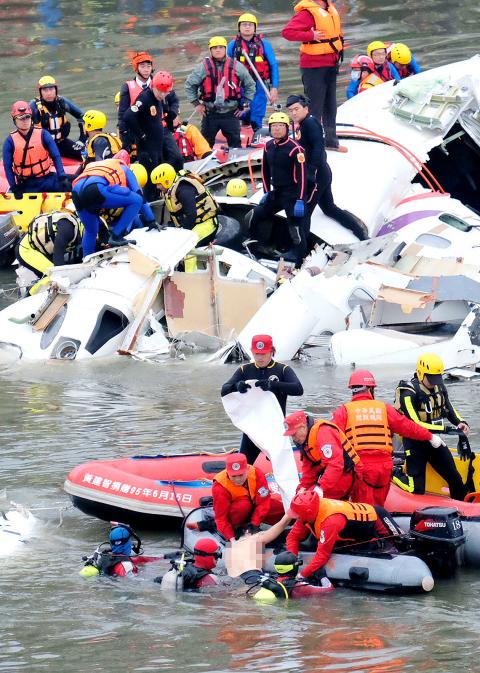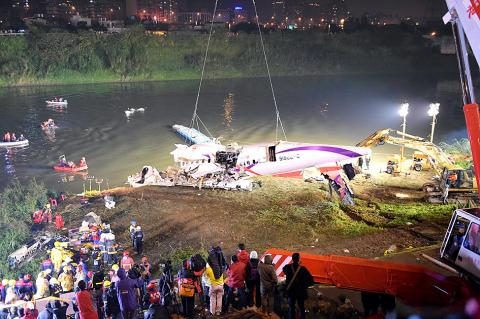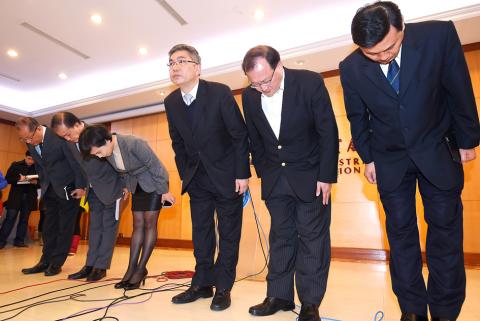A TransAsia Airways (復興航空) airplane flying from Taipei to Kinmen crashed into the Keelung River yesterday, killing at least 25 people, the Civil Aeronautics Administration (CAA) said.
Flight GE235 took off from Taipei International Airport (Songshan airport) at 10:52am, said the agency, which confirmed that it received a “Mayday” signal from the plane’s pilots at 10:53:35am.
Air traffic control personnel tried raising the pilots, but to no avail. Weather data provided by the control tower showed that visibility was 10km when the plane, an ATR 72-600, departed from Songshan airport.

Photo: Sam Yeh, AFP
The weather was quite stable, the CAA said.
The Aviation Safety Council, which is in charge of investigating the cause of the accident, said that it had found the flight data recorder and cockpit voice recorder — also known as the “black boxes” — and would soon start decoding the data.
The data are critical in identifying the cause of the air crash.

Photo: AFP
The plane was carrying 58 people on board: 53 passengers and five cabin crew members.
Thirty-one of the passengers are Chinese tourists, and 27 are Taiwanese. The plane was jointly piloted by 42-year-old Liao Chien-tsung (廖建宗) and 45-year-old Liu Tse-chung (劉自忠), with 4,914 hours and 6,922 hours of flying experience respectively.
Hong Bing-chung (洪炳衷), the copilot, served as an observer during flight as he was training to operate ATR 72-600 aircraft.

Photo: Liao Chen-huei, Taipei Times
Both Liao and Liu are experienced in flying ATR 72-type aircraft, with their flying hours topping 3,400 and 6,500 respectively.
The accident yesterday is TransAsia’s second crash within a year’s time. One of the airline’s ATR 72-500 aircraft crashed on July 23 last year at a village near Magong Airport in Penghu County, killing 48 people and injuring 10 people on board.
TransAsia management bowed and apologized to the victims and their families.
CEO Peter Chen (陳欣德) said that seven of the Taiwanese passengers purchased their tickets at Songshan airport’s check-in counters and only left their ID numbers, adding that the company was still trying to reach the families of the seven passengers.
Ten of the Taiwanese passengers are from Kinmen, he said.
Chen said the Chinese passengers were traveling with the Kaohsiung-based travel agencies Flying Tours (飛揚旅行社) and Sweet Tour (德運旅行社), in cooperation with agencies in Xiamen, China.
TransAsia has asked the travel agencies to help contact the families of the victims, Chen said.
Chen said the company would not speculate on the cause of the air crash, and would fully cooperate with the authorities in the investigation.
The company confirmed that the airplane’s No. 1 engine was replaced with a new one provided by the manufacturer, Pratt & Whitney Canada, when the plane first landed in Macau on its way to Taiwan. The No. 1 engine had only been in operation for 800 hours, the company said.
Chen said the ATR 72-600 aircraft were purchased to replace the company’s ATR 72-500 airplanes as part of its move to upgrade its fleet.
Yu Yi-shi (喻宜式), deputy director of the CAA’s flight standards division, said that Uni Air (立榮航空) has 12 ATR 72-600 planes, while TransAsia has six ATR 72-500s and four ATR 72-600s.
He said that all of the nation’s ATR 72-type airplanes will undergo special inspection in the next two days.
“Because the accident happened with TransAsia’s airplanes, the airline is given one night to complete all the examinations before their aircraft could be cleared to take off on Feb. 5, including engines, propellers. Uni, on the other hand, must finish the same process before Feb. 6,” Yu said.
Information from both the CAA and TransAsia showed that the airline received the aircraft on April 14 last year, with the last maintenance being done on Jan. 26.
Meanwhile, the Environmental Protection Administration (EPA) responded shortly after the crash to address possible fuel leakage.
EPA Department of Environmental Monitoring and Information Management Director-General Chu Yu-chi (朱雨其) said his agency had deployed four survey sites along the section of the river between Nanhu Bridge (南湖大橋) and Minquan Bridge (民權大橋), where the accident took place, to monitor water quality within a 5km stretch along the Keelung River every two hours.
The EPA has also requested help from the Taipei City and New Taipei City governments to deploy two fuel locks under the Rainbow (彩虹橋) and Chengmei (成美橋) bridges to contain possible leakage and driftage, Department of Water Quality senior specialist Wei Wen-yi (魏文儀) said.
Additional reporting by Sean Lin

A Chinese aircraft carrier group entered Japan’s economic waters over the weekend, before exiting to conduct drills involving fighter jets, the Japanese Ministry of Defense said yesterday. The Liaoning aircraft carrier, two missile destroyers and one fast combat supply ship sailed about 300km southwest of Japan’s easternmost island of Minamitori on Saturday, a ministry statement said. It was the first time a Chinese aircraft carrier had entered that part of Japan’s exclusive economic zone (EEZ), a ministry spokesman said. “We think the Chinese military is trying to improve its operational capability and ability to conduct operations in distant areas,” the spokesman said. China’s growing

Nine retired generals from Taiwan, Japan and the US have been invited to participate in a tabletop exercise hosted by the Taipei School of Economics and Political Science Foundation tomorrow and Wednesday that simulates a potential Chinese invasion of Taiwan in 2030, the foundation said yesterday. The five retired Taiwanese generals would include retired admiral Lee Hsi-min (李喜明), joined by retired US Navy admiral Michael Mullen and former chief of staff of the Japan Self-Defense Forces general Shigeru Iwasaki, it said. The simulation aims to offer strategic insights into regional security and peace in the Taiwan Strait, it added. Foundation chair Huang Huang-hsiung

PUBLIC WARNING: The two students had been tricked into going to Hong Kong for a ‘high-paying’ job, which sent them to a scam center in Cambodia Police warned the public not to trust job advertisements touting high pay abroad following the return of two college students over the weekend who had been trafficked and forced to work at a cyberscam center in Cambodia. The two victims, surnamed Lee (李), 18, and Lin (林), 19, were interviewed by police after landing in Taiwan on Saturday. Taichung’s Chingshui Police Precinct said in a statement yesterday that the two students are good friends, and Lin had suspended her studies after seeing the ad promising good pay to work in Hong Kong. Lee’s grandfather on Thursday reported to police that Lee had sent

BUILDUP: US General Dan Caine said Chinese military maneuvers are not routine exercises, but instead are ‘rehearsals for a forced unification’ with Taiwan China poses an increasingly aggressive threat to the US and deterring Beijing is the Pentagon’s top regional priority amid its rapid military buildup and invasion drills near Taiwan, US Secretary of Defense Pete Hegseth said on Tuesday. “Our pacing threat is communist China,” Hegseth told the US House of Representatives Appropriations Subcommittee on Defense during an oversight hearing with US General Dan Caine, chairman of the Joint Chiefs of Staff. “Beijing is preparing for war in the Indo-Pacific as part of its broader strategy to dominate that region and then the world,” Hegseth said, adding that if it succeeds, it could derail